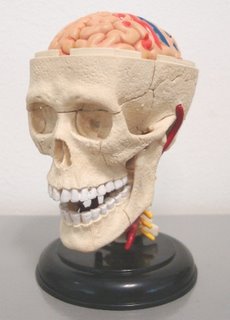 People like people who like them back.
People like people who like them back.As popular proverbs go: "A friend in need is a friend indeed", or "The best mirror is an old friend".
Wouldn't it be wonderful if everyone you knew became a good friend?
No more hate, negativity, animosity and conflict.
Pure bliss? Not quite.
Actually, if that really happened, you would be utterly fucked.
Why?!??
Two words.
Confirmation. Bias.
You see, there are too many people who think like this:
Human senses are fallible. There are light wavelengths we can't see, sound wavelengths we can't hear, chemicals we can't taste or smell, and even our sense of touch can be highly inaccurate. On top of that, they can become garbled or even deliberately fooled under certain conditions.
Scientists insist on only believing in things that can be physically observed. But what is the basis for this trust in our own senses? Don't you need "faith" to believe that human senses or human logic can actually decipher the true nature of reality?
Since science already takes this leap of "faith", why not abandon our imperfect human senses and use our "hearts" to perceive the ultimate truth instead?
To support this stand, an often repeated claim is that "you can't convince a completely colour-blind person that colour exists."

Sure you can.
Let the people who claim the existence of "colour" select some distinctly-coloured objects, say "red" and "green" apples, which is indistinguishable to the colour-blind individual.
Then get them to sort the apples by colour.
If different people from different places in the world consistently and repeatedly pick the same specific apples to be "red" and others to be "green", you're on to something.
If animals can also see this distinction, we know that colour is not limited to human senses alone.
If people can demonstrate that different coloured objects consistently reflect a corresponding wavelength of light, which can be perceived and measured by a machine, we know that colour is not limited to living systems alone.
Even better - if a pair of goggles can be made which will represent these colours as different checkerboard patterns, then the colour-blind individual can directly convince herself that colours really exist.
Using such a device, she would be able to sort out all coloured objects, not just apples, in exactly the same way that people who can see colour would.
Of course, this is same principle behind machines like IR goggles or X-ray machines or ultrasonic detectors or carbon monoxide detectors.
Our fallible human senses cannot perceive these stimuli unaided, but no sane person would dismiss their existence.
Let's say that you were tasked to decontaminate a radioactive room. Would you put your trust on a Geiger counter (which was constructed using all too fallible human senses and logic), or would you trust your "heart" that the room is safe?
More importantly, would you base your trust on the Geiger counter on "faith" just because someone in authority told you it works, or would you personally test its accuracy against some known radioactive samples first, before even stepping into the room?
The bottom line is: a single piece of information from one sensory modality is indeed suspect, but if multiple lines of evidence from multiple independent sources all align towards the same result, then the conclusion is highly trustworthy.
This not only forms the basis of science, but also the basis of the criminal justice system for all modern democracies.
In science, this is how we determined that gravity and biological evolution are real phenomena.
In both cases, multiple lines of evidence using numerous experimental techniques, performed by independent (sometimes adversarial) research groups over many years of work consistently converge towards the same conclusion.
No faith is necessary; indeed, disbelief in gravity or biological evolution has no effect on the reality of either process.
However, there is a caveat to this method of gaining knowledge.
The key term is "independent".
You can't trust multiple sources when they are too closely related to one other.
For instance, if my vision and hearing were conveyed into my brain on the same nerve, and I suddenly see and hear something odd at the same time, I cannot count these experiences as two independent sources of information.
That is the reason why there is potential for big trouble if you are completely surrounded by like-minded and mutually-dependent friends who share your ideals and goals.
I'll give you a vivid illustration of this.
Imagine you are an avid mountain climber on your first attempt to conquer Mount Everest. You embark on this arduous journey with a number of good friends all of whom, like you, deeply desire to scale the summit.
Not long after you leave the base camp, you start getting nauseous and tired. Your heart is beating disturbingly fast, and you are beginning to throw up often.
You don't feel so good.
But your friends insist that you are doing fine and that everyone is going through the same difficulties.
Why would they say that? Maybe they have no idea how much pain you are experiencing. Maybe they simply want to encourage you to keep going. Maybe they want you to share the joy of conquering the peak together.
Or maybe you play an important role in the team and they really need you to stick around in order to succeed.
Whatever the case, you reach a camp at the halfway mark with many climbers from other teams. Your friends congratulate you for your efforts.
But a complete stranger notices your physical condition and casually remarks:
"You look like shit. Better turn back now or you'll be the next body count this season."
And then you come across a veteran climber from another team who says:
"Whoa... take it easy, man. I haven't seen another person who is as messed up as you in three years. Maybe you should consider turning back... I know I would."
Who would you trust?
Your friends? Or a couple of unrelated strangers who have nothing to lose or gain from your triumph or demise?
I think you can see that it is unwise to surround yourself with too many friends or yes-men, because they do not represent truly independent sources of information.
Their fates have become too closely intertwined with yours to dare voice out any dissenting views, even if they reflect the reality of the situation.
This may not appear to be an immediate problem for huge social groups which have enough people and resources to craft their own social realities, for example through self-affirmation and self-fulfilling prophesies.
However, cocooned within this semblance of diversity, the group incorrectly assumes that a consensus was reached via multiple independent sources, gradually losing touch with the wider reality.
It may continue to believe that everything is hunky-dory even though many lines of evidence from disinterested parties indicate that major problems lie ahead.
I cannot emphasize enough that conclusions reached using evidence from multiple sources are only trustworthy if the sources are really independent. This strategy serves to compensate for the fallibility of any single mode of information.
You are thinking: "Well, since human senses are imperfect, who cares if it's one human sense or fifty human senses. Why not depend on a single, perfect heart?"
Just a tiny problem there.
Human "hearts" are also imperfect.
If you have ever been heartbroken before, you will know how wrong a "heart" can be.






2 Comments:
Sounds like good advice! Before accepting it though, I will start looking around for some independent confirmation first.
Exactly right!
Post a Comment